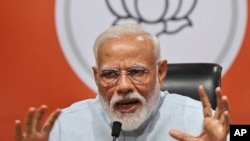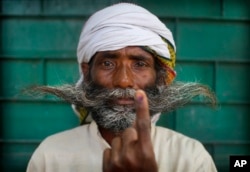Indian Prime Minister Narendra Modi will secure a second term in office according to exit polls announced after the country’s mammoth general election wrapped up on Sunday.
Millions of voters cast ballots in the final stage of the election for 59 seats in eight states that was held in stages over five weeks.
While Modi’s Hindu nationalist Bharatiya Janata Party had been projected as the frontrunner, there was uncertainty whether the party would secure a majority.
But five different exit polls broadcast by television channels said the party was set to win about 287 to 305 seats, comfortably crossing the halfway mark in the 545-member parliament.
According to projections, the main opposition Congress Party led by Rahul Gandhi would trail the BJP although it would improve upon the dismal showing in 2014. Along with its allies it was projected to win 124 to 128 seats.
However exit polls in the past have not always been accurate due to the scale and complexity of India’s vote that involves 900 million eligible voters. Vote counting will be done on Thursday.
Out of the 59 parliamentary seats up for grabs on Sunday, the most high profile contest took place in Modi’s constituency in the Hindu holy city of Varanasi in northern Uttar Pradesh.
It was a crucial state that had handed the BJP 71 out of 80 seats in 2014 helping it win a sweeping victory.
Intense electoral battle
Polling was held for 13 of those seats on Sunday. The state of 200 million people, which sends the most lawmakers to parliament, symbolized the intense electoral battle waged by opposition parties to try and oust the BJP. Sinking their deep differences, two regional caste-based parties that command large support bases had allied to give the BJP a much tougher fight than in 2014 but according to exit polls it was still set to win a majority of the seats in the state.
According to exit polls, the party also fared well in its bastions in Hindi heartland states such as Madhya Pradesh and Rajasthan where losses in local elections in December had raised fears that it would suffer losses.
Sunday’s vote wraps up an unusually vitriolic campaign that virtually turned into a referendum on Prime Minister Modi.
Adopting a strong nationalist pitch, Modi campaigned on his image as a tough and decisive leader best suited to rule India and tackle arch rival Pakistan, with which it was engaged in air skirmishes that raised fears of a war in February.
“He became the only issue. This is the recurring theme, that he alone is protector of India. That is what came across very strongly,” says Mukhopadhyay. “In this campaign the Hindutva agenda [Hindu nationalism] was at the forefront, the deliveries of the government were not the primary issues.”
At election rallies, his opponents accused him of stirring up strident nationalism to skirt bread and butter issues such as growing unemployment and growing rural distress that are hurting millions. Accusing him of “divisive” politics during his five-year rule and pointing to rising attacks against minorities, they said the BJP is destroying the “idea” of a secular nation.
After the campaign wrapped up this week, Prime Minister Modi exuded confidence. “I believe this is the first time in a long time that a majority government is winning a second term with a majority,” he told reporters “It’s a big thing.”
The BJP has firmed up alliances with regional parties in case the majority mark eludes the party.
On the other hand, his opponents — the main opposition Congress party along with regional parties are also hoping to join in an alliance to challenge the BJP if it falls short of that majority. Several parties have held discussions in recent days on forming what some analysts have called an “anti-Modi” front if the numbers stack up in their favor.
“The animosity towards the BJP is so high among a large number of politcial parties that they would be willing to sink their differences to form an alternative government,” says Nilanjan Mukhopadhyay, an independent political analyst.
The exact picture of which which way India is headed will come on Thursday when votes are counted.
The world’s biggest election was held in seven stages this year. Voting so far has largely been peaceful barring sporadic violence in the state of West Bengal.





